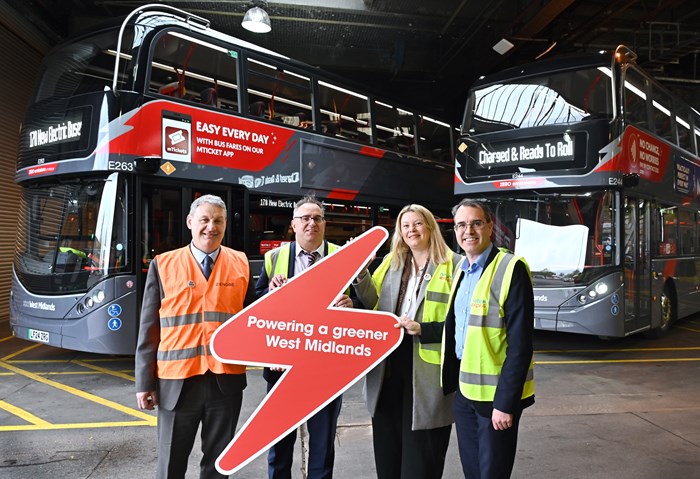Mayor welcomes roll out of 170 new zero-emission electric buses on the region's roads
Published: Wednesday 16 Apr 2025
West Midlands residents can now enjoy smoother, quieter and greener bus journeys thanks to a new fleet of zero emission buses now in service across the region.
The roll out of 170 new Alexander Dennis Enviro 400 double decker bus by National Express West Midlands has been welcomed by Richard Parker, the Mayor of the West Midlands
It is part of a £95 million investment by the company to modernise its fleet, reinforcing the company’s commitment to creating a more sustainable future for public transport.
The arrival of these state-of-the-art buses bring the total number of electric buses in operation to 329, meaning nearly a quarter of National Express West Midlands’ bus fleet is now zero emissions.

L-R: Ian Allder, business development director, Zenobe; Antony Goozee, bus strategy & commercial director, National Express West Midlands; Jo Shore, director of delivery, Transport for West Midlands; Cllr. Tim Huxtable, chair of Transport Delivery Overview & Scrutiny Committee, WMCA
The bus operator's investment has been welcomed by Richard Parker, the Mayor of the West Midlands.
He said: “This region is leading the way on greener public transport – with an entire fleet of electric buses being delivered in Coventry and now 170 new zero-emission buses across Birmingham, the Black Country and Solihull. That means cleaner air, quieter streets and a more comfortable, reliable service for passengers.
“Buses are the backbone of our network, with over half a million trips made in the region each day. That’s why we continue to work closely with our bus operators to decarbonise public transport and support our green transport revolution for a cleaner and healthier West Midlands while creating a network which works for everyone.”
Each electric bus saves an average of 61 tonnes of carbon annually, reducing carbon emissions by almost 20,000 tonnes every year * - a significant step towards tackling climate change and improving air quality in the Midlands.
Antony Goozee, bus strategy and commercial director at National Express West Midlands, said: “Replacing our diesel buses with electric vehicles and modernising our depots are key steps in our journey towards operating a fully zero-emission bus fleet by 2030. These new clean, green double-decker buses are not just about improving efficiency and reducing our environmental impact, they also deliver a better experience for our passengers with quieter, smoother and more comfortable journeys.”
In addition to the new vehicles, National Express West Midlands has completed a major infrastructure upgrade of its Yardley Wood depot. Originally built in 1938, the depot has been modernised with the installation of advanced charging infrastructure as part of ongoing efforts to future-proof its operations and ensure long-term sustainability in its services. The bus operator’s Perry Barr depot is also undergoing an electrification upgrade which is due to complete in the coming weeks.
Supporting this transition is EV fleet and battery storage specialist Zenobē, providing an end-to-end Electric Transport as a Service (ETaaS) solution to National Express West Midlands. This includes financing the vehicles and the on-board batteries to guarantee their performance while in use and replacing them at the end of their first, usable life. Zenobē also installed dedicated rapid chargers and integrated its proprietary software platform to help monitor and optimise energy use, as well as parts and operational support.
The buses produce zero carbon emissions at the tailpipe and are powered by renewable zero carbon energy, with additional support of a second-life battery installed at the depot by Zenobē. Repurposed from old electric bus batteries that have come to the end of their first life, the second-life battery ensures that all buses are charged sufficiently by releasing stored energy during peak periods. They take four hours to charge and can run for up to 280km, depending on the time of year. The buses are equipped with USB charging, modern passenger information systems and enhanced wheelchair and buggy capacity.
Steven Meersman, co-founder director of Zenobē, said: “Today marks another key milestone in National Express’s journey toward a zero-emission future, and Zenobē is proud to be a driving force behind it. What began over six years ago with just 19 vehicles at Yardley Wood has grown into a nationwide partnership, now supporting over 300 vehicles across the country. From procuring vehicles and onboard batteries to designing and managing charging infrastructure, we’ve delivered a fully tailored, end-to-end solution at Yardley Wood that supports National Express’s bold ambitions and meets their long-term operational goals.”
Further enquiries
For all other enquiries from members of the public go to our contact us page: https://www.wmca.org.uk/contact-us/
